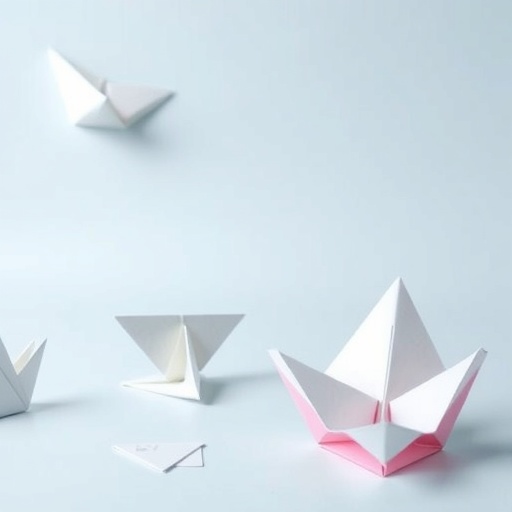In a world increasingly driven by technology and complex cognitive demands, the search for innovative therapeutic interventions has led researchers to explore unconventional avenues to enhance mental health and cognitive function. A groundbreaking systematic review conducted by Mendonça et al. has unveiled the intriguing potential of origami—an ancient Japanese art form—as a cognitive intervention tool. The findings of this study shed light on how engaging with origami can stimulate not merely creativity but also contribute to cognitive development and mental well-being.
The review meticulously synthesizes existing literature on the cognitive effects of origami, delving into how this art form can harness the powers of focus, memory, and dexterity. Participants in various studies reported significant improvements in their cognitive abilities after engaging with intricate paper-folding tasks. The tactile experience of handling paper combined with the challenge of mastering complex designs appears to provide a unique mental workout, reminiscent, in some ways, of traditional puzzles and brain games.
Notably, the authors highlight the inherent therapeutic benefits that origami offers, particularly for individuals experiencing cognitive decline or mental health disorders. Engaging in origami provides a dual benefit: it serves as a creative outlet while simultaneously demanding concentration and problem-solving skills. This combination fosters a mindset conducive to cognitive rehabilitation, making it an attractive option for therapists and caregivers alike seeking alternatives to standard therapeutic techniques.
Moreover, the systematic review touches on the social dimensions of engaging with origami. Group activities centered around this art form can enhance collaboration and communication skills among participants. In community or therapy settings, friendships can blossom as individuals bond over shared experiences in crafting origami. This social interaction is especially vital for vulnerable populations, including the elderly, who often face isolation and loneliness.
The authors meticulously evaluate the methodologies employed in the studies reviewed, underscoring the importance of rigorous experimental design. They note that successful outcomes are often contingent upon structured interventions, where participants receive tailored instructions and support to navigate the complexities of origami patterns. This highlights a promising direction for future research: optimizing origami-based interventions to harness their cognitive benefits effectively.
As technology continues to evolve, merging traditional artistic practices like origami with modern therapeutic frameworks offers innovative pathways for cognitive enhancement. Mendonça et al. suggest that therapists incorporate origami into treatment plans for conditions such as ADHD, anxiety, and depression. By using origami as a tool for mindfulness, individuals can focus their attention and reduce stress levels, providing immediate short-term relief as well as longer-term cognitive benefits.
Cultural aspects are paramount in understanding the implications of using origami for cognitive therapy. The authors recognize origami’s historical significance in Japanese culture, where it symbolizes patience, creativity, and dedication. Introducing this art form into cognitive therapy not only preserves its cultural heritage but also enriches therapeutic practices. There is an emerging recognition of the need to honor cultural artifacts in psychological interventions, thereby fostering a diverse therapeutic landscape.
As awareness of the potential benefits of origami grows, educational institutions might also consider incorporating these practices into school curricula. Teaching children to fold paper not only cultivates their creativity but also enhances their fine motor skills and cognitive functioning. Early introduction to such cognitive exercises may promote lifelong learning habits and improve academic performance among students.
While the current findings are promising, the authors underscore the necessity for further research to bolster the claims about origami’s effectiveness. Subsequent studies must address gaps in the literature, particularly concerning long-term outcomes and the comparative effectiveness of origami against other cognitive interventions. Establishing robust empirical evidence will be crucial in legitimizing origami as a mainstream therapeutic practice.
In conclusion, the systematic review presents a compelling case for the cognitive intervention potential of origami. By bridging artistic expression with psychological benefits, origami emerges as a transformative tool that resonates with individuals across demographics. As mental health continues to be a priority, integrating diverse methods such as origami into therapeutic practices could pave the way for innovative and effective interventions that speak to the needs of many.
The study by Mendonça et al. serves as a catalyst for further exploration into the cognitive benefits of art forms and their impact on psychological well-being. The time is ripe for mental health professionals to embrace unconventional methods that not only enrich individual experiences but also foster community connections through shared creative pursuits.
This holistic approach could reshape how we perceive cognitive therapy, expanding its boundaries beyond traditional methods to include rich, experiential learning opportunities. The findings underscore that the path to cognitive health may sometimes lie in art—and in the simple act of folding paper.
By acknowledging and embracing the multifaceted benefits of engaging with origami, we not only honor a cultural heritage but also provide a compassionate response to the pressing concerns of our modern world. This study heralds a new era where creative arts play a pivotal role in our collective psychological resilience and cognitive vitality.
Subject of Research: Cognitive intervention through origami.
Article Title: Cognitive intervention through the use of origami: a systematic review.
Article References:
Mendonça, A.R., de Carvalho, J.S.A., Landeira-Fernandez, J. et al. Cognitive intervention through the use of origami: a systematic review.
Discov Psychol 5, 120 (2025). https://doi.org/10.1007/s44202-025-00450-4
Image Credits: AI Generated
DOI: 10.1007/s44202-025-00450-4
Keywords: Origami, Cognitive Intervention, Mental Health, Therapeutic Art, Systematic Review.




